Abstract
Stress is purported to be a major cause of non-ulcer dyspepsia, defined here as dyspepsia where peptic ulcer, oesophagitis, and cancer are excluded by endoscopy. There is a subgroup of non-ulcer dyspepsia patients who have no definite cause for their dyspepsia, provisionally termed essential dyspepsia. The aim of the present study was to determine if stress, as measured by major life events, was associated with essential dyspepsia. The frequency of life events during the year before the diagnosis of essential dyspepsia in 68 consecutive patients was compared with the frequency of these events over the same time period in 68 randomly selected age and sex-matched community controls. The mean number of events and the associated life change and distress scores were similar for both groups. Concerning individual events, patients reported more minor personal illness (p = 0.008). When events were broadly categorised, only one difference was found - more controls reported bereavements (p = 0.008). Age, sex, social class, and the duration of dyspepsia did not influence the number and nature of events. Although the study suggests that stress, as measured by major life events, is not associated with dyspepsia of unknown cause, it does not exclude the fact that other forms of stress, especially that associated with chronic difficulties, may be relevant.
Full text
PDF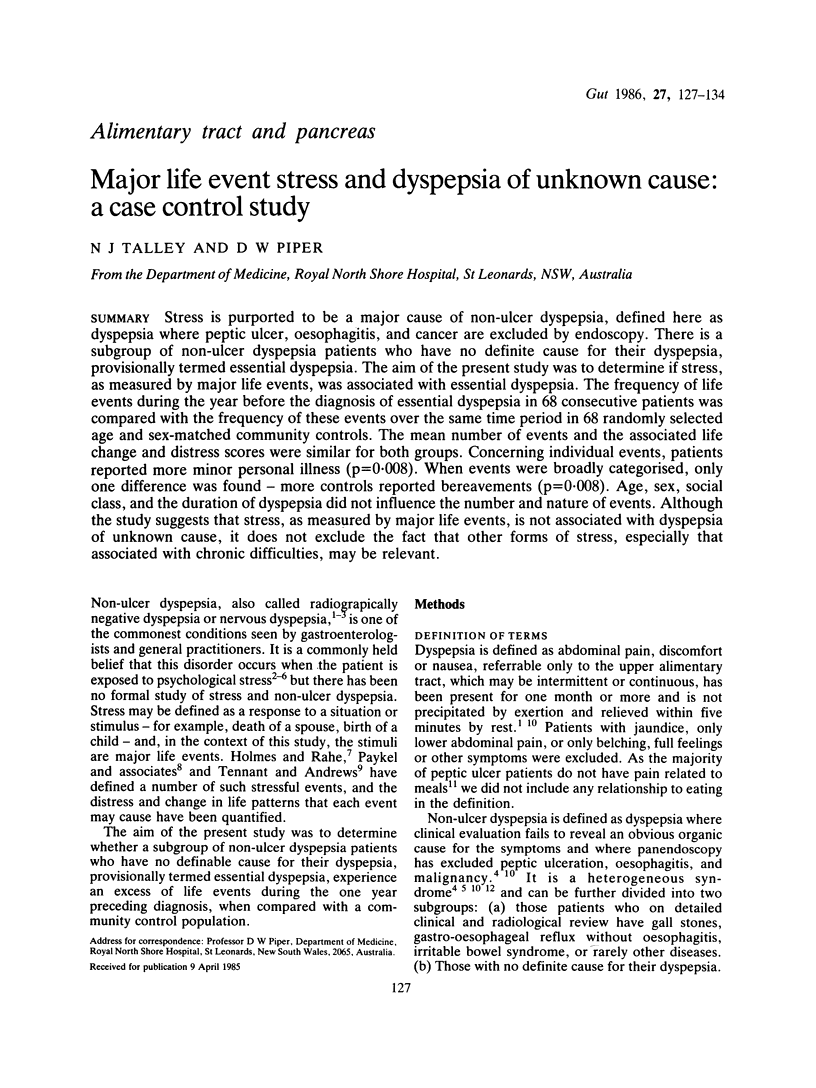
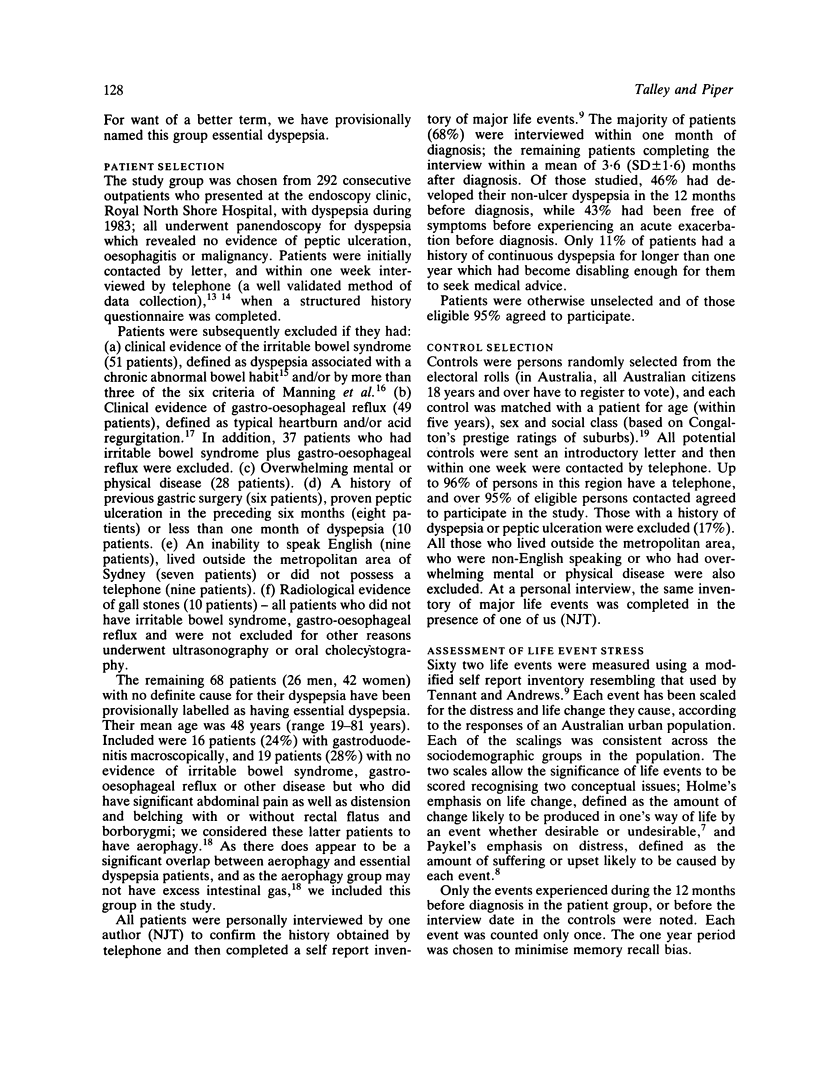
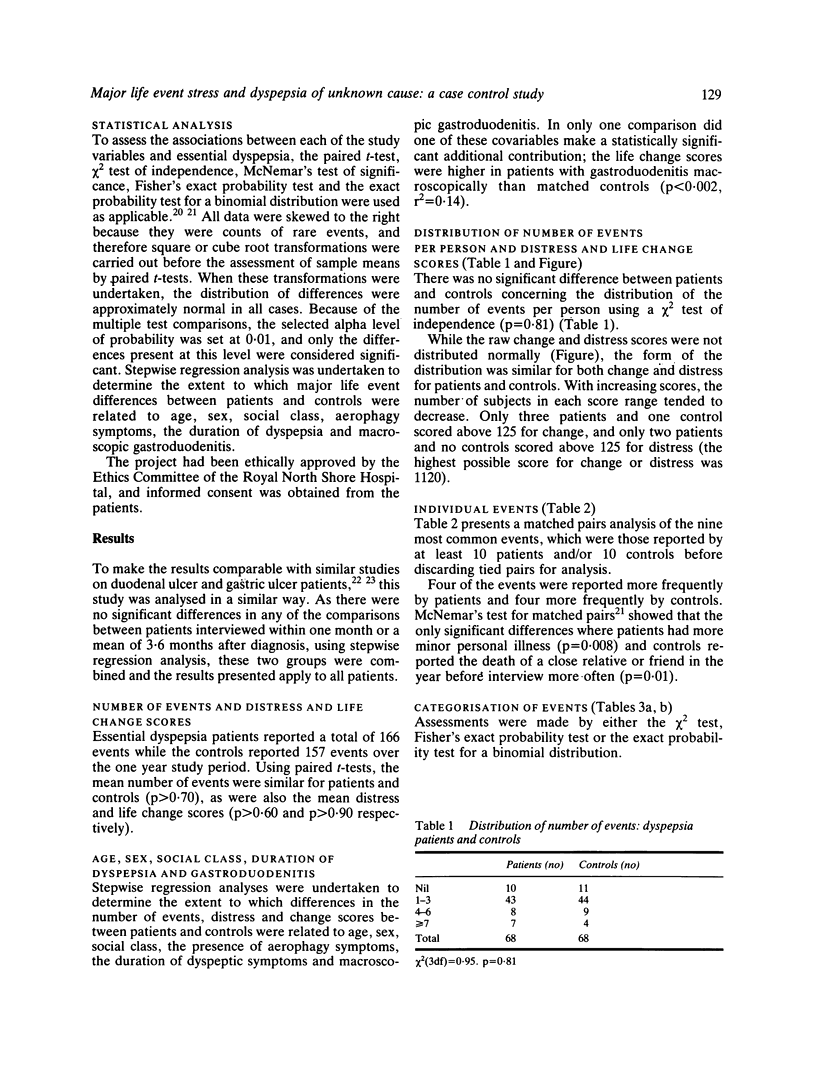
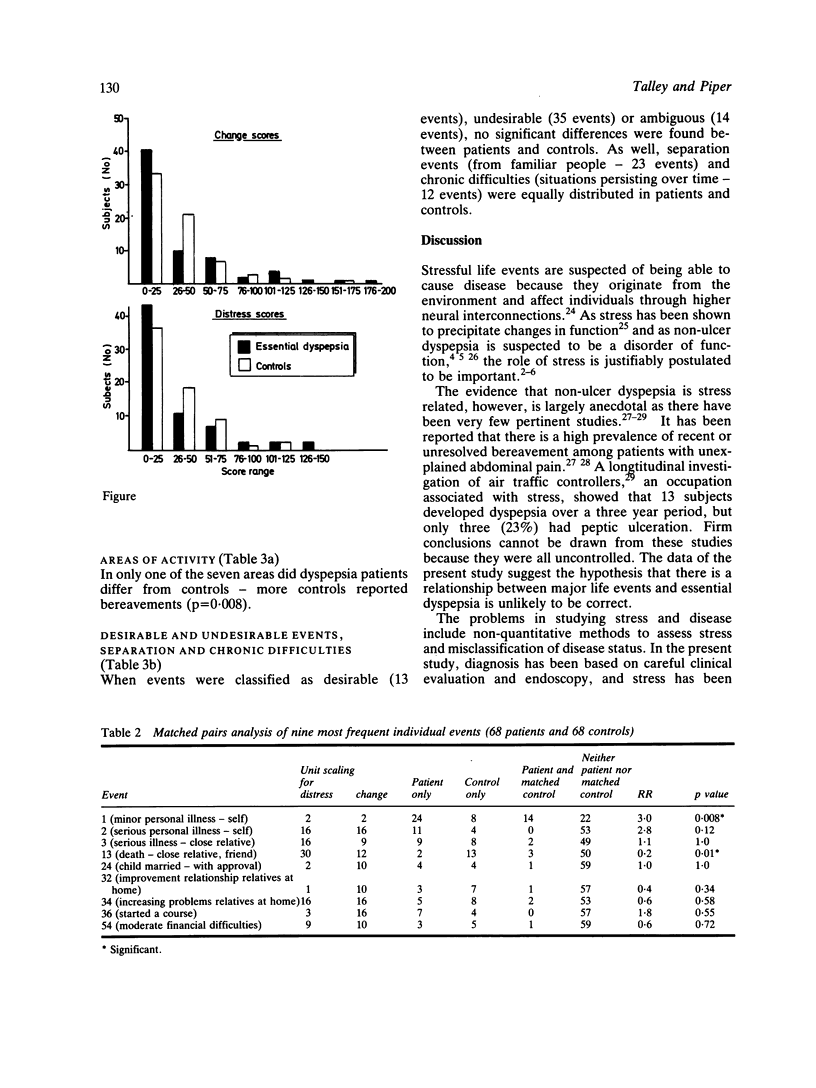
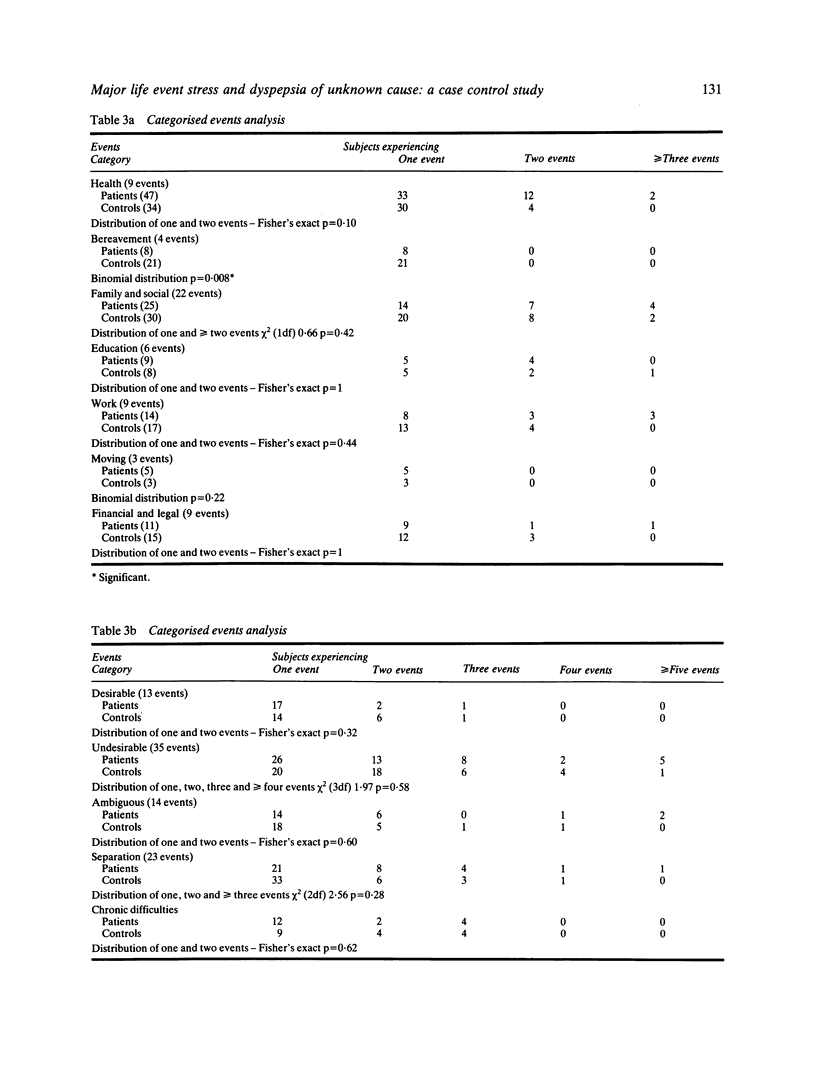
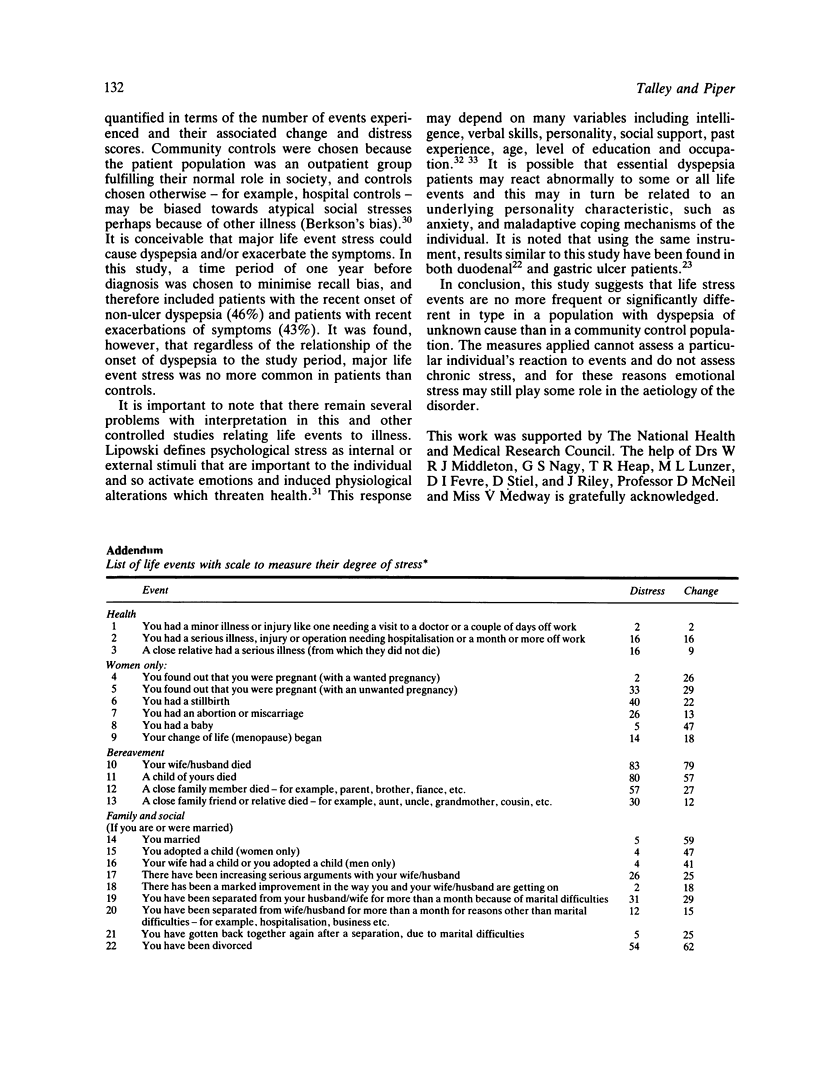
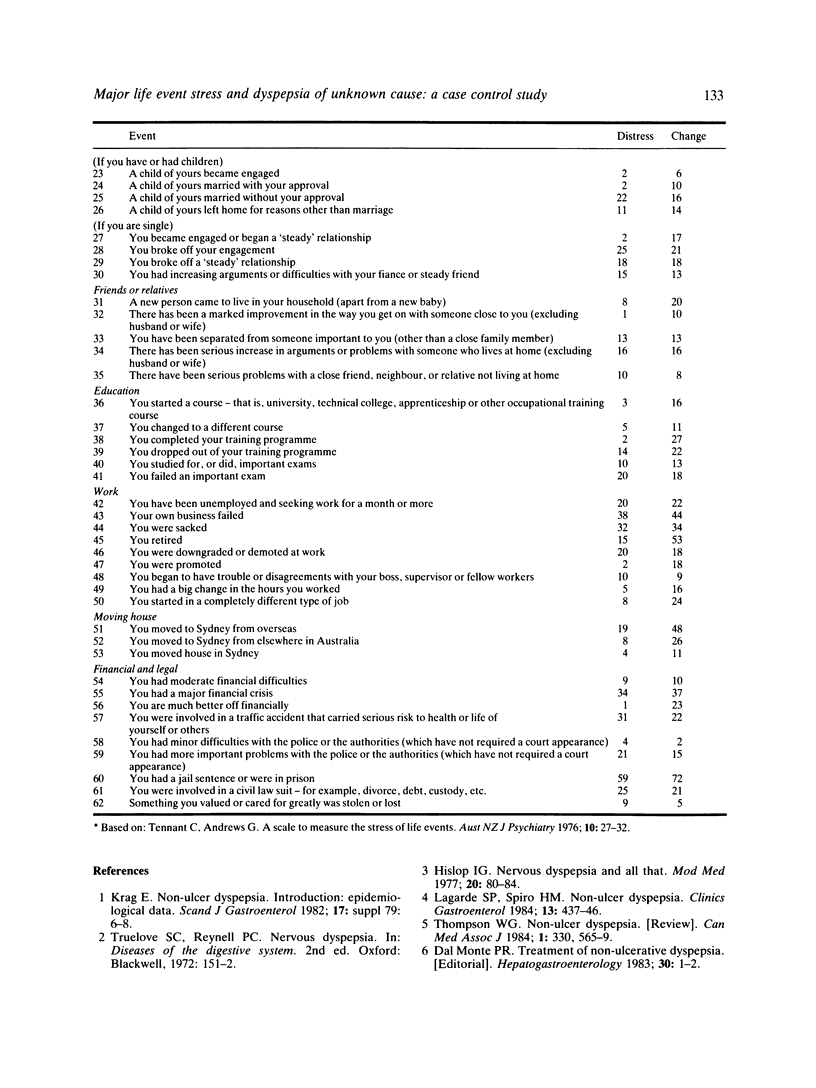
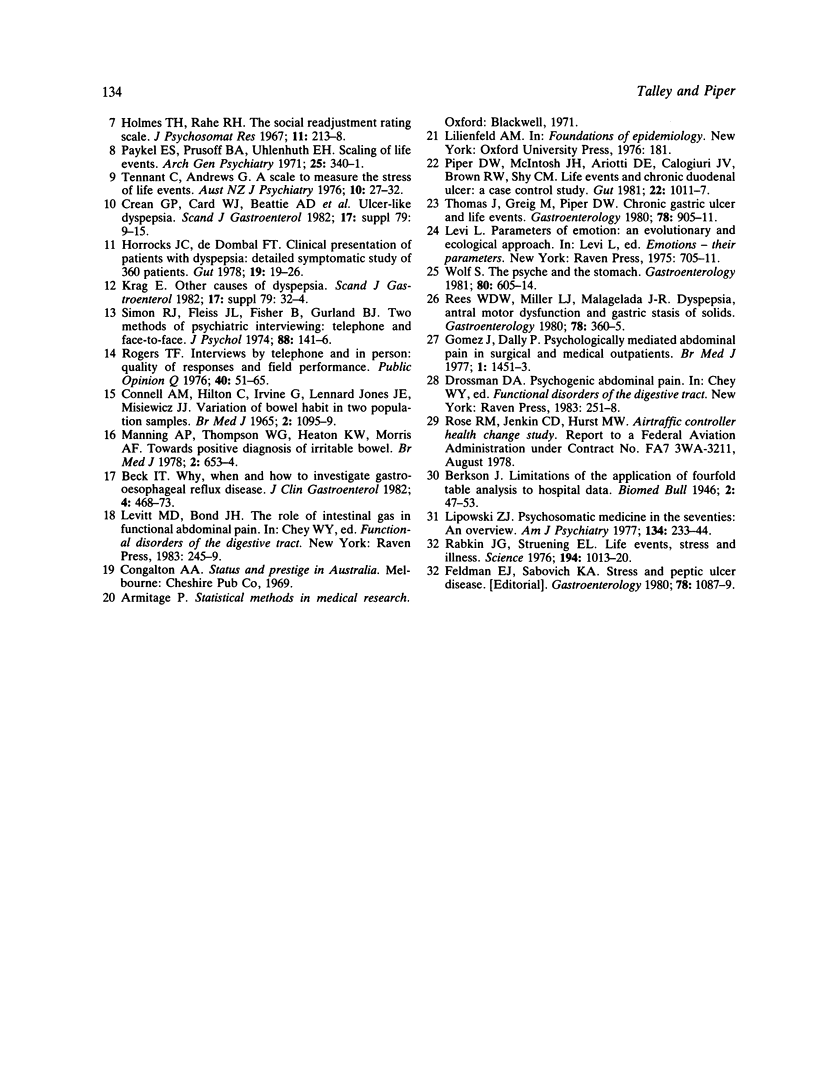
Selected References
These references are in PubMed. This may not be the complete list of references from this article.
- Beck I. T. Why, when, and how to investigate gastroesophageal reflux disease. J Clin Gastroenterol. 1982 Oct;4(5):468–473. doi: 10.1097/00004836-198210000-00016. [DOI] [PubMed] [Google Scholar]
- Connell A. M., Hilton C., Irvine G., Lennard-Jones J. E., Misiewicz J. J. Variation of bowel habit in two population samples. Br Med J. 1965 Nov 6;2(5470):1095–1099. doi: 10.1136/bmj.2.5470.1095. [DOI] [PMC free article] [PubMed] [Google Scholar]
- Crean G. P., Card W. I., Beattie A. D., Holden R. J., James W. B., Knill-Jones R. P., Lucas R. W., Spiegelhalter D. "Ulcer--like dyspepsia". Scand J Gastroenterol Suppl. 1982;79:9–15. [PubMed] [Google Scholar]
- Dal Monte P. R. Treatment of non-ulcerative dyspepsia. Hepatogastroenterology. 1983 Feb;30(1):1–2. [PubMed] [Google Scholar]
- Feldman E. J., Sabovich K. A. Stress and peptic ulcer disease. Gastroenterology. 1980 May;78(5 Pt 1):1087–1089. [PubMed] [Google Scholar]
- Gomez J., Dally P. Psychologically mediated abdominal pain in surgical and medical outpatients clinics. Br Med J. 1977 Jun 4;1(6074):1451–1453. doi: 10.1136/bmj.1.6074.1451. [DOI] [PMC free article] [PubMed] [Google Scholar]
- Holmes T. H., Rahe R. H. The Social Readjustment Rating Scale. J Psychosom Res. 1967 Aug;11(2):213–218. doi: 10.1016/0022-3999(67)90010-4. [DOI] [PubMed] [Google Scholar]
- Horrocks J. C., De Dombal F. T. Clinical presentation of patients with "dyspepsia". Detailed symptomatic study of 360 patients. Gut. 1978 Jan;19(1):19–26. doi: 10.1136/gut.19.1.19. [DOI] [PMC free article] [PubMed] [Google Scholar]
- Lagarde S. P., Spiro H. M. Non-ulcer dyspepsia. Clin Gastroenterol. 1984 May;13(2):437–446. [PubMed] [Google Scholar]
- Lipowski Z. J. Psychosomatic medicine in the seventies: an overview. Am J Psychiatry. 1977 Mar;134(3):233–244. doi: 10.1176/ajp.134.3.233. [DOI] [PubMed] [Google Scholar]
- Manning A. P., Thompson W. G., Heaton K. W., Morris A. F. Towards positive diagnosis of the irritable bowel. Br Med J. 1978 Sep 2;2(6138):653–654. doi: 10.1136/bmj.2.6138.653. [DOI] [PMC free article] [PubMed] [Google Scholar]
- Paykel E. S., Prusoff B. A., Uhlenhuth E. H. Scaling of life events. Arch Gen Psychiatry. 1971 Oct;25(4):340–347. doi: 10.1001/archpsyc.1971.01750160052010. [DOI] [PubMed] [Google Scholar]
- Piper D. W., McIntosh J. H., Ariotti D. E., Calogiuri J. V., Brown R. W., Shy C. M. Life events and chronic duodenal ulcer: a case control study. Gut. 1981 Dec;22(12):1011–1017. doi: 10.1136/gut.22.12.1011. [DOI] [PMC free article] [PubMed] [Google Scholar]
- Rabkin J. G., Struening E. L. Live events, stress, and illness. Science. 1976 Dec 3;194(4269):1013–1020. doi: 10.1126/science.790570. [DOI] [PubMed] [Google Scholar]
- Rees W. D., Miller L. J., Malagelada J. R. Dyspepsia, antral motor dysfunction, and gastric stasis of solids. Gastroenterology. 1980 Feb;78(2):360–365. [PubMed] [Google Scholar]
- Simon R. J., Fleiss J. L., Fisher B., Gurland B. J. Two methods of psychiatric interviewing: telephone and face-to-face. J Psychol. 1974 Sep;88(1ST):141–146. doi: 10.1080/00223980.1974.9915723. [DOI] [PubMed] [Google Scholar]
- Tennant C., Andrews G. A scale to measure the stress of life events. Aust N Z J Psychiatry. 1976 Mar;10(1):27–32. doi: 10.3109/00048677609159482. [DOI] [PubMed] [Google Scholar]
- Tennant C., Andrews G. A scale to measure the stress of life events. Aust N Z J Psychiatry. 1976 Mar;10(1):27–32. doi: 10.3109/00048677609159482. [DOI] [PubMed] [Google Scholar]
- Thomas J., Greig M., Piper D. W. Chronic gastric ulcer and life events. Gastroenterology. 1980 May;78(5 Pt 1):905–911. [PubMed] [Google Scholar]
- Wolf S. The psyche and the stomach. A historical vignette. Gastroenterology. 1981 Mar;80(3):605–614. [PubMed] [Google Scholar]


